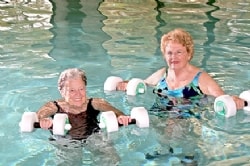
By David Burch
Not long ago, it was common belief that older adults didn’t need to exercise — retirement was time to just sit and relax. Another widespread idea was that exercise was actually harmful for people with certain ailments — “I can’t exercise because I have heart disease.” Now, more people than ever, at all ages, are exercising. So, does age-old wisdom prevail, or is exercise important for senior adults? If it is important, how much is enough?
First, let’s put to rest any thoughts that some people should not exercise. Previous generations who did physical labor on the farm and then retired to a sedentary life often found that their health rapidly declined. The benefits of continued physical activity have been proven again and again. Exercise literally improves everything — strength, endurance, flexibility, balance, mental clarity and more. Many people don’t realize that there is a direct correlation between strength and balance. Those who exercise tend to have faster reflexes, which aid in driving safely and catching yourself from falling. Exercise can prevent disease or slow its progression. People who have maintained a regular exercise routine recover faster from surgery. So, how can you know what exercise is best for you and how much is enough?
There are right and wrong ways to go about exercising at any age and with any health condition. First, talk to your physician. He/she will be able to best advise you on avoiding certain exercises that could be harmful with your specific health conditions. He/she may advise you to see a physical therapist or exercise physiologist, who can show you which exercises to do, how to do them properly, and explain how each exercise will benefit you.
What is the best exercise for senior adults? If I’ve said it once, I’ve said it a million times: the one that you will do! You should find something that you enjoy — or else exercise becomes a lot like watching paint dry. If you’re bored, you probably won’t stick with it. Other than that, the best all-around exercise for seniors is aquatics. Exercising in water is safer because your body weight is supported. Every movement is met with consistent resistance and you can move in all directions. A heated pool (89°) is best because it encourages flexibility, preventing muscle strain and is particularly beneficial for arthritis sufferers. At Advent Christian Village’s Copeland Community Center, we have a lift that allows people with limited mobility access to the pool. Some who have used walkers for years have experienced improved mobility after spending time in the pool.
For senior adults, I believe the goal should be functional fitness, in order to feel your best and maintain your independence. When beginning a new physical activity, the key is to start slowly and gradually build up. I start older adults on the stationary bike for two minutes and then increase it each session. Some people think two minutes is a waste of time and want to do more, but I’m trying to prevent muscle soreness the next day. Two minutes of exercise is better than none at all. I tell people that they have the rest of their life to increase.
It’s good to be consistent in how often you exercise — at least three days each week is best. Once you have established a routine, set a minimum workout that you will do each session (possibly going back to two minutes on the bike), even when you don’t feel like it. Many times, people don’t exercise at all on days they don’t feel “up to par,” then it becomes hard to get back to it when they are feeling better. As long as you aren’t actually ill, it is good to do some exercise. Often people report that they feel better after a small amount of activity.
Listen to your body. It will tell you if you are doing too much. Muscle fatigue is normal, but if you experience stabbing pain, joint pain, shortness of breath, chest pain, dizziness, or confusion, stop exercising immediately and seek medical attention. Ask advice on how to begin exercising safely again.
Every day I see the impact that consistent exercise has on senior adults. I’ve seen people with Parkinson’s disease slow its progression. Several of our members have been told by their doctors that their exercise routine has prevented a heart attack or stroke. The benefits of physical activity cannot be overstated. Even though every exercise is not right for everybody, everybody at any age can benefit from exercise.
To help encourage regular exercise, we recently launched a new program at ACV this year: Move to Improve. Instead of encouraging our members to make a resolution to just exercise more, we’ve striven to make any movement something to celebrate. You don’t have to go to the gym to exercise. Walking your dog around the neighborhood, sitting in a kitchen chair and doing leg lifts, doing arm curls with soup cans, and doing yard work are all ways to keep moving and improving. At ACV, we’ve measured walking distances, set up exercise stations in public areas, and are promoting our many exercise programs and classes, including the exercise program available twice a day on ACV’s closed-circuit TV channel, Sit and Be Fit. The key to improving is simply to keep moving.
If you’d like more information on Move to Improve or the Copeland Community Center at Advent Christian Village — which is open to the public — call (386) 658-5555.
About the author: David Burch has been the Director of Copeland Community Center, Advent Christian Village’s wellness and fitness center, since 2001. He is an exercise physiologist and received his degree from the University of Florida. During his training, he enjoyed working with the Gator athletes, but he also discovered his love for senior adults. David teaches exercise classes and develops customized exercise programs for each CCC member.